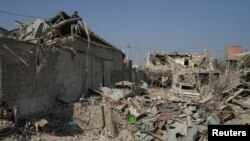Armenia and Azerbaijan accused each other Sunday of violating a new humanitarian cease-fire in the Nagorno-Karabakh region, just hours after it took effect.
In a Twitter message early Sunday, Armenia’s Defense Ministry accused Azerbaijan of violating the new cease-fire in the Nagorno-Karabakh region by firing artillery shells and rockets.
“Once again violating the humanitarian ceasefire, the enemy fired artillery shells in the northern direction from 00:04 to 02:45, and fired rockets in the southern direction from 02:20 to 02:45.”
Azerbaijan’s Defense Ministry said in a statement later that "the enemy fired at the vicinity of the Jabrail city, as well as the villages of this region ... using mortars and artillery," adding that the Azeri army "took adequate retaliatory measures."
United Nations Secretary-General Antonio Guterres also spoke out against the hostilities as he condemned “all attacks on populated areas impacted by the Nagorno-Karabakh conflict.”
In a statement issued through spokesperson Stephane Dujarric, the secretary-general referenced a recent attack on Azerbaijan’s second-largest city, Ganja, as “totally unacceptable, as are indiscriminate attacks anywhere...”
“As he underscored again in his latest calls with the Foreign Ministers of Armenia and Azerbaijan, both sides have the obligation under international humanitarian law to take constant care to spare and protect civilians and civilian infrastructure in the conduct of military operations,” the statement went on to say.
Azerbaijan and Armenia announced they had agreed to a new cease-fire beginning Sunday, the second attempt in a week to temper almost three weeks of fighting in Nagorno-Karabakh.
"The Republic of Armenia and the Republic of Azerbaijan have agreed to a humanitarian truce as of October 18, 00h00 local time," Armenia's Foreign Affairs Ministry said late Saturday.
Azerbaijan's Foreign Affairs Ministry issued an identical statement.
The announcements came after Russian Foreign Minister Sergey Lavrov spoke by phone with his Armenian and Azeri counterparts. Lavrov and French President Emmanuel Macron both stressed that the cease-fire must be strictly observed by both sides.
Earlier Saturday, Azerbaijan and Armenia accused each other of new attacks, a further indication that violence has escalated in the disputed Nagorno-Karabakh region in violation of a Russian-brokered truce that took effect a week ago.
Meanwhile, UNICEF called Saturday for an immediate humanitarian cease-fire, declaring in a statement that children have been killed, injured and displaced by the fighting, forcing them to endure weeks of “extreme psychological trauma and distress.”
“Children, families and the civilian facilities that they depend upon must be protected, in line with international human rights and humanitarian law. A complete cessation of hostilities is in the best interest of all children,” the statement said.
The ongoing fighting between Azerbaijan and Armenia erupted Sept. 27 and has killed hundreds of people, marking the biggest escalation of the decades-old conflict over breakaway region of Nagorno-Karabakh since a 1994 cease-fire.
The predominantly ethnic Armenian territory declared its independence from Azerbaijan in 1991 during the collapse of the Soviet Union, sparking a war that claimed the lives of as many as 30,000 people before a 1994 cease-fire. However, that independence is not internationally recognized.





